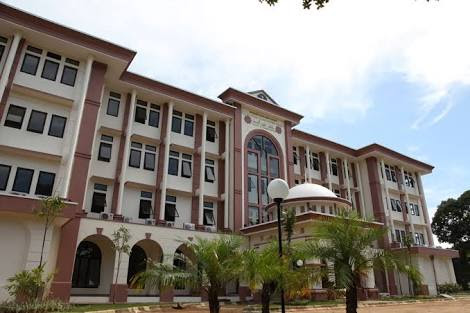DEVELOPMENT OF PDF FLIP-BASED E-MODULE FOR MATHEMATICS LEARNING
PENGEMBANGAN E-MODULE BERBASIS FLIP PDF UNTUK PEMBELAJARAN MATEMATIKA
Abstract
This research of development aims to develop an e-module based on Flip PDF with valid, practical, and effective integer and fraction material. This research conducted in R&D (Research and Development) design with ADDIE’s development model which included 5 stages, those are analysis, design, development, implementation, and evaluation. Respondents of the product development trial were grade VII students of SMP Negeri 25 Bulukumba with 64 students. The research instrument was a media assessment sheet by media experts and material experts to measure the validity and then questionnaires for teacher and student responses to measure the practicality of the mathematics e-module. The results showed that the mathematics e-module fulfilled the validity and practical criteria. The product meets the criteria of validity based on the assessment by the material expert with an average score of 3.88 and the assessment by the media expert with an average score of 3.33. The product meets the practicality criteria based on student responses with an average score of response at 3.72, categorized as practical, and teacher responses with an average score of response at 3.7, categorized as very practical. Based on the data criteria above, it can be concluded that the mathematics e-module can be used in learning activities. Further research can be done by developing learning media on specific abilities.
Downloads
References
Aisyah, N., Hawa, S., Somakin, Purwoko, & Hartono, Y. (2007). Pengembangan pembelajaran matematika SD. Jakarta: Dekdiknas.
Allen, W. C. (2006). Overview and evolution of the ADDIE training system. Advances in Developing Human Resources, 8(4), 430–441. https://doi.org/10.1177/1523422306292942.
Astalini, Darmaji, Kurniawan, D. A., & Chen, D. (2021). Students’ perceptions of mathematical physics e-module on multiple integral material. Journal of Education Technology, 5(4), 531–538. https://doi.org/10.23887/jet.v5i4.33600.
Aulia, E. T., & Prahmana, R. C. I. (2022). Developing interactive e-module based on realistic mathematics education approach and mathematical literacy ability. Jurnal Elemen, 8(1), 321–249. https://doi.org/10.29408/jel.v8i1.4569.
Broza, O., Biberman-Shalev, L., & Chamo, N. (2023). “Start from scratch”: Integrating computational thinking skills in teacher education program. Thinking Skills and Creativity, 48(101285). https://doi.org/10.1016/j.tsc.2023.101285.
Delita, F., Berutu, N., & Nofrion. (2022). Online learning: The Effects of using e-modules on self-efficacy, motivation, and learning outcomes. Turkish Online Journal of Distance Education-TOJDE, 23(4), 93–107.
Depdiknas. (2006). Kurikulum tingkat satuan pendidikan (KTSP). Jakarta: Depdiknas.
Dulun, O., & Lane, J. F. (2023). Supporting critical thinking skills needed for the international baccalaureate diploma programme: A content analysis of a national and two international education programs in Turkey. Thinking Skills and Creativity, 47(101211). https://doi.org/10.1016/j.tsc.2022.101211.
Hadiyanti, N. F. D., Hobri, Prihandoko, A. C., Susanto, Murtikusuma, R. P., Khasanah, N., & Maharani, P. (2021). Development of mathematics e-module with stem-collaborative project-based learning to improve mathematical literacy ability of vocational high school students. Journal of Physics: Conference Series, 1839, 1–7. https://doi.org/10.1088/1742-6596/1839/1/012031.
Hidayat, W., Rohaeti, E. E., Ginanjar, A., & Putri, R. I. I. (2022). An epub learning module and students’ mathematical reasoning ability: A development study. Journal on Mathematics Education, 12(1), 103–118. https://doi.org/10.22342/jme.v13i1.pp103-118.
Kurniawan, D. A., Astalini, Darmaji, Tanti, & Maryani, S. (2022). Innovative learning: Gender perception of e-module linear equations in mathematics and physics. Indonesian Journal on Learning and Advanced Education, 4(2), 92–106. https://doi.org/10.23917/ijolae.v4i2.16610.
Maryam, Masykur, R., & Andriani, S. (2019). Pengembangan e-modul matematika berbasis open ended pada materi sistem persamaan linear dua variabel kelas VIII. AKSIOMA: Jurnal Matematika Dan Pendidikan Matematika, 10(1), 1–12. https://doi.org/10.26877/aks.v10i1.3059.
Mulyasa, E. (2009). Menjadi guru profesional. Bandung: PT Remaja Rosdakarya.
Nasrullah, Upu, H., & Syahrullah. (2017). Model pembelajaran STTP bagi mahasiswa dalam penyusunan modul pembelajaran matematika berbasis exelearning. Jurnal Matematika Dan Pembelajaran, 5(2), 112–120. https://doi.org/10.33477/mp.v5i2.172.
Patri, S. F. D., & Heswari, S. (2021). Development of ethnomathematic-based on mathematics e-module to improve students’ logical thinking skills. AIP Conference Proceedings. https://doi.org/10.1063/5.0043250.
Prastowo, A. (2011). Metode penelitian kualitatif dalam perspektif rancangan penelitian. Yogyakarta: Ar Ruzz Media.
Rahman, A., Wibawa, B., & Sumantri, S. (2022). Develop english electronic module for tourism through analysis of learners and context. The Asian Institute of Research Education Quarterly Reviews, 5(1), 48–57. https://doi.org/10.31014/aior.1993.05.01.417.
Rahmawati, D., Vahlia, I., Mustika, Yunarti, T., & Nurhanurawati. (2022). Validity analysis of development of socrates-based linear algebra e-modules. Education Quarterly Reviews, 5(2), 357–364. https://doi.org/10.31014/aior.1993.05.02.495.
Roof, H., & Chimuma, L. (2022). The relationship among reading, math and science achievement: exploring the growth trajectories over three time points. Educational Research: Theory and Practice, 33(2), 32–49.
Sabri, A. (2010). Strategi belajar mengajar micro teaching. Jakarta: PT Ciputat Press.
Sagita, D. (2016). Peran bahan ajar LKS untuk meningkatkan prestasi belajar matematika. Seminar Nasional Pendidikan Matematika Ahmad Dahlan, 37–44. Retrieved from http://seminar.uad.ac.id/index.php/sendikmad/article/view/10.
Sahelatua, L. S., Vitoria, L., & Mislinawati. (2018). Kendala guru memanfaatkan media IT dalam pembelajaran di SDN 1 Pagar Air Aceh Besar. Jurnal Ilmiah Pendidikan Guru Sekolah Dasar, 3(2), 131–140.
Sanchal, A., & Sharma, S. (2017). Students attitudes towards learning mathematics: impact of teaching in a sporting context. Teachers and Curriculum, 17(1), 89–99.
Serevina, V., Sunaryo, Raihanati, Astra, I. M., & Sari, I. J. (2018). Development of e-module based on problem-based learning (PBL) on heat and temperature to improve students’ science process skills. TOJET: The Turkish Online Journal of Educational Technology, 17(3), 26–36.
Somayasa, W., Natajaya, N., & Candiasa, M. (2013). Pengembangan modul matematika realistik disertai asesmen otentik untuk meningkatkan hasil belajar matematika peserta didik kelas X di SMK Negeri 3 Singaraja. Jurnal Penelitian Dan Evaluasi Pendidikan Indonesia, 3(1). Retrieved from https://ejournal-pasca.undiksha.ac.id/index.php/jurnal_ep/article/view/625/410.
Sutrisno, E. (2019). Pengembangan e-modul matematika interaktif menggunakan visual studio [UIN Raden Intan Lampung]. Retrieved from http://repository.radenintan.ac.id/7186/.
Sutrisno, J. (2008). Teknik penyusunan modul. Jakarta: Direktorat Pembinaan Sekolah Menengah Kejuruan.
Wiyoko, T., Sarwanto, & Rahardjo, D. T. (2014). Pengembangan Media Pembelajaran Fisika Modul Elektronik Animasi Interaktif untuk Kelas XI SMA ditinjau dari Motivasi Belajar Siswa. Jurnal Pendidikan Fisika, 2(2), 16–19. Retrieved from https://jurnal.fkip.uns.ac.id/index.php/pfisika/article/view/4670.
Copyright (c) 2023 Alimuddin Tampa, Nasrullah, Khairil Amry

This work is licensed under a Creative Commons Attribution 4.0 International License.

